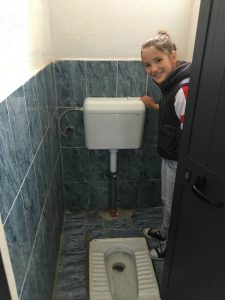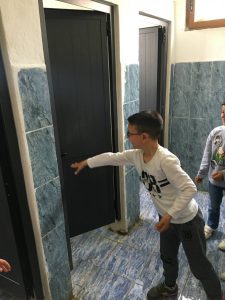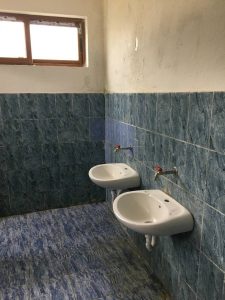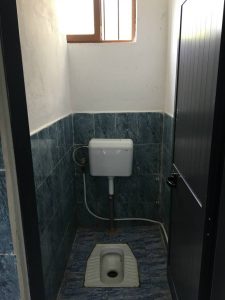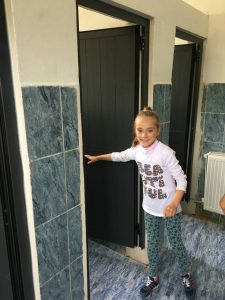This project has been completed under the direction of Peace Corps Volunteer Jordan Arvayo. To read about the start of the project, CLICK HERE.
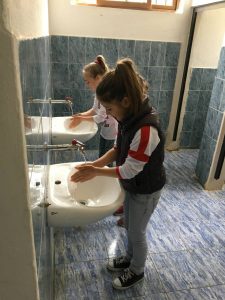 The project was designed to restore the main bathroom of Rubik’s 9-year school, promote healthy living, and to benefit girls.
The project was designed to restore the main bathroom of Rubik’s 9-year school, promote healthy living, and to benefit girls.
Jordan reports:
Bathroom Renovation Completed
Local professionals repaired five sinks, replaced the light fixtures, restored the broken glass windows, remodeled the toilet stalls’ concrete entrances, installed doors for all eight toilet stalls, added toilet paper holders to each stall, replaced two Turkish toilets, and repaired seven flusher cisterns.The Story
At the beginning of the 2016-2017 school year, in Rubik’s 9-year school, I created and administered a short anonymous survey for students in grades 4 – 9 to assess the students’ needs and wants for health education. From the survey, I observed that many female students were interested in gaining more information about puberty. Generally, the young girls wanted to understand the body changes related to menstruation, how to care for their bodies during menstruation, who to turn to for support, and where to go to take care of female hygiene needs.With further investigation, I discovered that the young girls often skipped school during their menstruation cycles because the school’s bathrooms were unsafe, unreliable, and unfit to help students practice good hygiene. With no stall doors, broken glass windows, no running water, disassembled pipes, no toilet paper, no hand soap, and no trash cans, the school’s bathroom was a scary place for young girls.
Now that the water project is complete and the school staff is continuously working to educate students about bathroom cleanliness, the 9-year school is more reliable and appropriate for children. I have been lucky enough to be able to build relationships with the female students and gain their confidence; thus, the young ladies feel free to honestly give me opinions about the value of the water project. The girls have thanked me and the school staff for beginning to normalize puberty and for renovating the bathrooms.
Goals Achieved, Changes in Initial Objectives, and Community Feeling
Our community achieved both the bathroom renovation goal and the initial education goal. The Rubik 9-year school now houses a bathroom with private stalls, hot running water, functional toilets, and all other accessories that have been previously mentioned. After the renovation, each grade of students toured the new bathroom area and participated in a hygiene promotion lesson. Additionally, female students in grades 5 – 9 participated in a puberty lesson. Throughout the rest of the school year, and in years coming, the 9-year school teachers will continue to provide health lessons related to bathroom needs and opportunities.The community successfully accomplished the project goals by focusing and expanding on the core objectives. For this particular type of project, the objectives were extremely simple and clear; thus, all project partners were able to easily fulfill their duties and no changes were made to the initial objectives.
The power of local inclusiveness held to be one of the most vital aspects of the project. With support and positivity hailing from many community institutions, small issues were quickly resolved with a 5-minute phone call or a meeting over coffee. I have truly never seen a greater collaboration within an entire town. During the planning, implementation, and finalization of the project, I never encountered a negative or confused person or group of people in Rubik. It seemed that our team reached our goal to inform and include as many town residents as possible. We had unwavering, strong support throughout the entire process.
Capacity and Skills Built
This water project helped to build capacity and skills within Rubik through physical, educational, and social project components.
The laborers who completed the bathroom renovation were highly skilled, with much experience; thus, the reconstruction only provided an opportunity to improve their trade skills, rather than learn new skills. However, the plumber, electrician, and construction workers graciously offered to supervise a few 14 and 15-year-old male students as apprentices. This pleasant surprise allowed the boys to shadow the workers and learn a few repair techniques. These students learned the names of tools, the process of installing sinks and toilets, important details to look for when choosing metal pipes versus plastic pipes, and much other knowledge. The casual apprenticeships served to build capacity, relationships, respect, and professional futures.
Although the bathroom renovation is the most obvious opportunity to build capacity, I believe that the education and social components were and will be the most significant aspects of the project to initiate change within the community. Due to the multitude of lessons our team provided for the entire 9-year school, and the educational posters that were posted around the community by the students, the town is now armed with enough basic knowledge to at least understand the issues related to the lack of hygiene, respect, and support for the education of all students (with a special regard for female adolescent students). Although it will take more time to teach students how to unite and battle these issues, our team is confident that the physical, emotional, and mental health of our students will slowly improve with the continuation of our sustainable education program.
Sustainability
Sustainability will be achieved with hands-on community involvement and a continuing education component. Because parents and students donated time and effort into completing the water project, a sense of pride may prevent community members from defacing or destroying the renovations. Many, if not all, of the construction workers involved in this project, are parents of the students who attend Rubik’s 9-year school. Friends and family members of these generous workers are bound to respect the work of a loved one. Also, the two janitors of the school will maintain the cleanliness of the bathrooms daily. As for the education aspect, peer-educators will be utilized to maintain health lessons each year. The health lessons will initiate discussions about proper handwashing techniques, anti-flu practices, the importance of privacy, respect for public property, and respect for peers. During the rest of the school year, the school staff will conduct monthly health lessons to remind students about the importance of maintaining good hygiene and respectful attitudes.Unfortunately, consumable items, such as soap and toilet paper, still do not currently have a sustainable status. The school relies on parents and community members to provide toilet paper for the students. The school director continues to form an official agreement with the mayor of the Mirditë region to provide a small sum of money, each year, to purchase toilet paper and hand soap.
We extend our thanks to Jordan for completing this important project, and to the Robert Victor Sager and Beatrice Mintz Sager Foundation for providing the funding.
